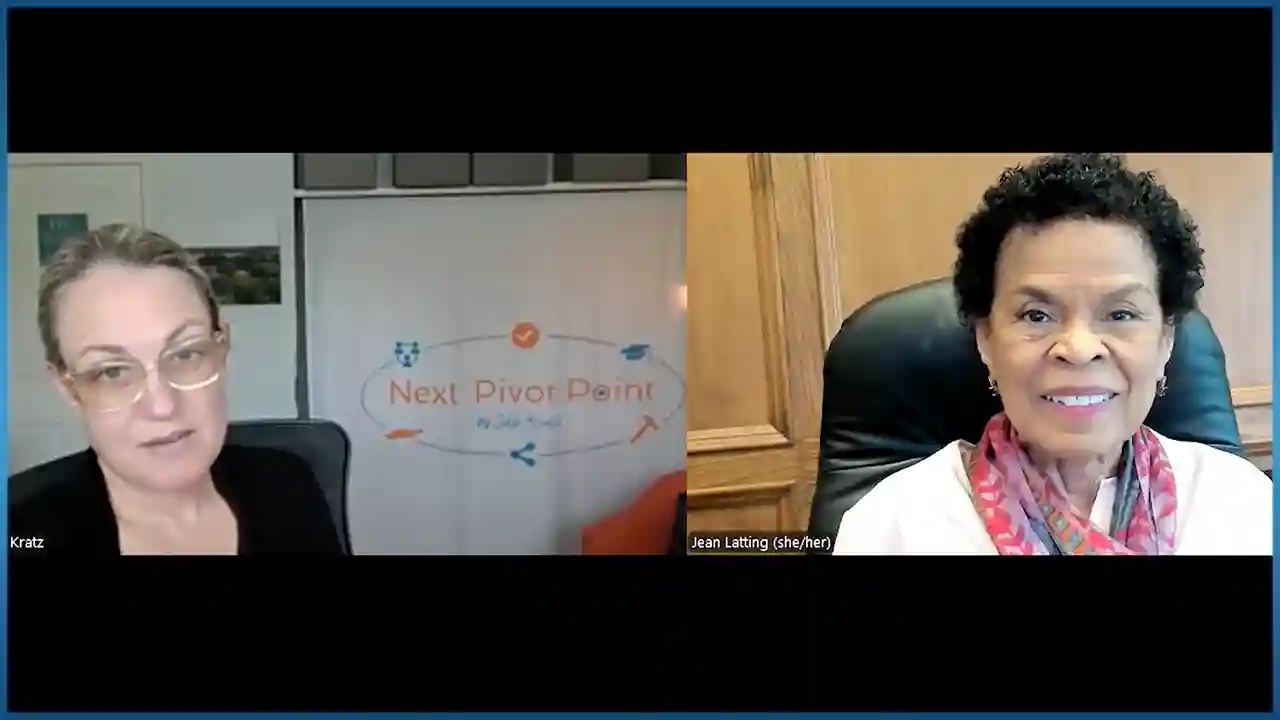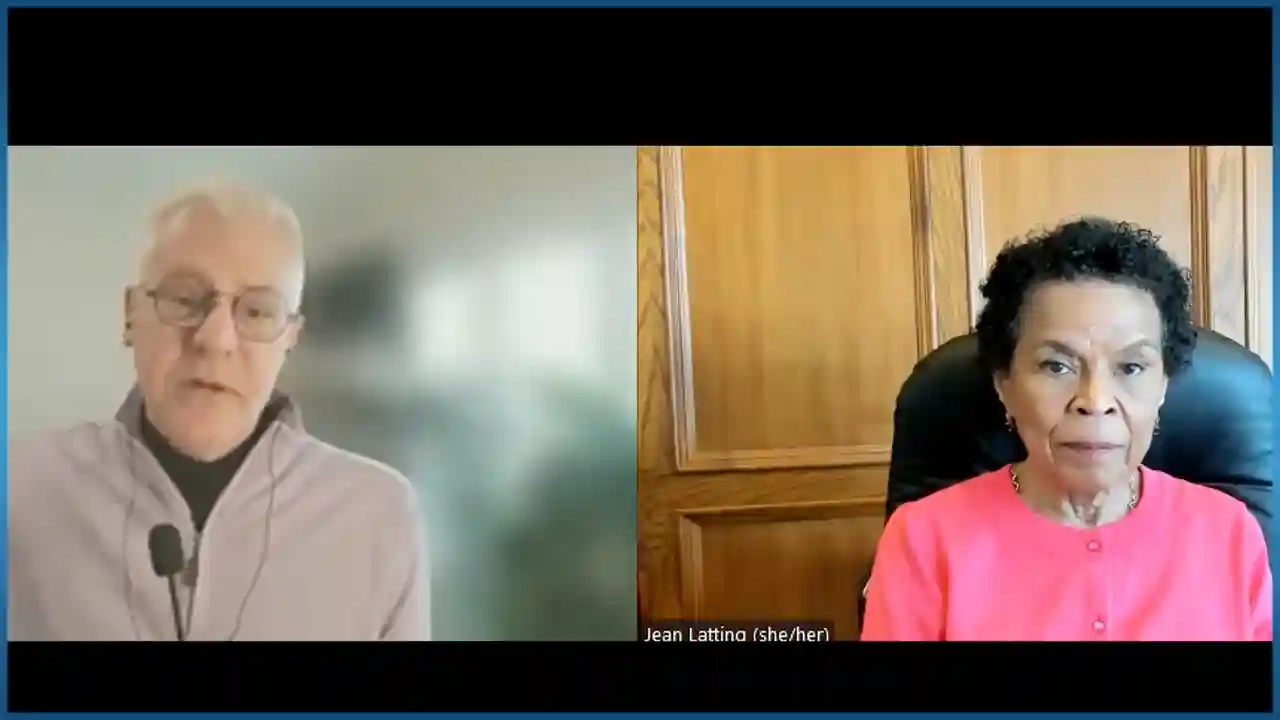


Jean Latting
Julie Kratz, a renowned expert in allyship, discusses strategies for fostering inclusive leadership and engaging those who are persuadable but uncertain.


Jean Latting
Dr. Brad Johnson, a White male clinical psychologist who has spent most of his professional life learning and teaching how to encourage female talent.


Jean Latting
Jean interviews Minal Bopaiah, author of Equity: How to Design Organizations Where Everyone Thrives. She has much to say about the long and complicated path for DEI.


Jean Latting
What do these two historically oppressed groups, Holocaust Museum Houston and the Kinsey Collection of African American Art, have in common?


Jean Latting
Lisa Fain speaks with Jean about the growth potential for mentors and mentees when they truly speak with, listen to, and respect each other’s personhood.


Jean Latting
In this podcast, Hamza Khan and Jean Latting engage in an animated conversation about leadership, resilience, belonging, and burnout.


Jean Latting
Amri Johnson has a few provocative things to say about the current state of efforts toward diversity, equity, and inclusion.


Jean Latting
Jean sums up her history of optimism, the arc of social justice, and the deliberate steps one has to take to keep an eye on the prize.


Jean Latting
Jean discusses transitional justice and the race class narrative: what works, what doesn’t, and how to stay the course.


Jean Latting
Given our country’s long and difficult history with inclusiveness, Jean decided to sit down and write out her thoughts – during this year’s Black History Month.


Jean Latting
How do you self-identify? Our identities affect our allyship with those who are being marginalized because of one or more of their identities.


Jean Latting
Nina proposes susceptibility to harmful radiation and absorption of Vitamin D as the simple explanation for why people have different skin colors, a product of evolutionary adaptation.


Jean Latting
Jean started listening to Steve Kerr, coach of the Golden State Warriors, honing in on his leadership skills. She was blown away by his insights.


Jean Latting
Dr. Pratt learned how to follow the whisper of the spirit, work within and without the system, address racism and sexism head on, and promote impactful diversity initiatives.


Jean Latting
In today’s world, leadership is not about telling people what to do. Rod McCowan trains leaders to consider moral principles when making decisions.


Jean Latting
Victor Varnado, born with albinism, chose to beat the odds stacked against him in life by using his comedic skills to pursue his dreams.


Mike Todt
The Gross National Happiness Index exists, and it works in Bhutan as well as other countries. Mike writes of his upcoming visit to Bhutan to see this phenomenon in action.


Jean Latting
In June of 2023, the Supreme Court ruled against the use of affirmative action in college admission.


Jean Latting
Ilana Redstone says the Certainty Trap happens when we have moral principles we are 100% sure of and shut out any objections to the contrary.


Carole Marmell
We realized my brother was gay when his photo was on the cover of Time magazine titled “The Homosexual in America”.


Jean Latting
Dr. Melissa Ochoa has a few things to say about the word Latinx; mainly, she doesn’t like it. For one thing, it doesn’t work in Spanish. Hear what she proposes instead.


Jean Latting
Journalist Talia Lavin began a social experiment aimed at understanding and exposing the White nationalist movement.


Jean Latting
When disaster inevitably strikes, what is your response? Wait for someone to fix it, dwell on the unfairness of it all? What do you need to move ahead?


Jean Latting
The polarization in this country has grown so vast that words we use in common do not mean the same things. Is there any hope for bridging the divide?


Jean Latting
Dina Gilio-Whitaker answers what would be lost if Indigenous people were completely assimilated into White society and if they would even be accepted?


Elizabeth Rubio
Today’s guest blogger explores the meaning – both literally and emotionally – of finding your way through the profusion of labels and why they matter.


Jean Latting
Dave's novel approach toward disrupting the school to prison pipeline and his ability to understand multiple cultures brings him to this interview.


Jean Latting
More people at the societal level are questioning if the best person always wins. We’ll explore monopoly as meritocracy and what is truly best.


Jean Latting
Dr. Kira Banks talks about her work with internalized oppression, what she calls appropriated racial oppression.


Jean Latting
Stephen B. Karpman’s drama triangle represents a pattern of dysfunctional relationships. It can exist in domestic situations and in the workplace too.


Jean Latting
Jean asks André Harris about his sickle cell, his experience with sexual assault, and his ability to thrive where others might have given up.


Gig Mensah
How did Afrophobia get started, what are the signs it actually exists, and, especially, what can we do about it?


Jean Latting
Leading Consciously can help you in emotional suppression & engage in powerful listening.


Jean Latting
Amy Porterfield's honest and difficult journey with her commitment to justice, her missteps and along the way, the model of a very public apology.


Jean Latting
Dr. Larry Brendtro founded Resilience Resources based on his work with troubled and Indigenous youth.


Jean Latting
Interplay between victims and perpetrators: those who owned slaves/were slaves, Germans/Israelis of the Holocaust, or oppressors/ indigenous people.


Francine Derby
One young lawyer’s struggle to be accepted for who she is, why ADHD reveals a racial divide, and how to make differences work for everyone.


Jean Latting
The R-word can set nerves on fire. How do we talk about racism without engaging others' emotions and shutting down their ability to think clearly?


Jean Latting
Brandon discusses stereotyping, ostracism, effemiphobia -phenomenon of people not wanting to be associated with the negative parts of themselves & BLM.


Amy Hageman
Words mean different things in different contexts. How are you to know if the words you are using form a connection – or hinder it?


Jean Latting
Understanding high and low context is essential to communicating effectively in conversations.


Jean Latting
Dr. Thomas Keith's recent book, The Bro Code, identifies ways in which men are raised that impede their development and relationships with others.


Jean Latting
Charles speaks about exploring generational identity and professional lives of Black women. No one has heard any of their stories.